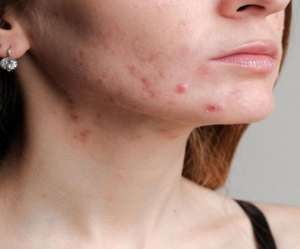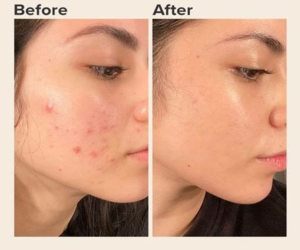TREATING AND PREVENTING ACNE BREAKOUTS
Acne prevention and treatment
- What is acne?
- What causes acne?
- What are the different types of acne breakouts?
- How can you prevent acne?

Acne, breakouts, pimples, zits – whatever you may call them, is a super common struggle, especially for teenagers! Approximately 8 out of 10 teens get acne at some point. Being one of the most prevalent skin conditions in the world, not only does it affect your physical appearance but it also has an impact on your emotional and mental well-being.
In this article, we will be diving into the world of acne, from exploring its causes, treatment options, and to ways of acne prevention, we will be talking about it all.
WHAT IS ACNE?
To begin with, we must first understand what acne really is. Acne is a common skin condition that causes pimples, whiteheads, and blackheads to pop up not only on your face but also on your back, chest, and shoulders
A lot of us think that acne is a teenage problem, although it is not true. Acne can affect people of all ages.
Now, let’s understand what causes these pimples and breakouts on your skin.
WHAT CAUSES ACNE?
Our skin has tiny openings which are called pores. Each pore is connected to a hair follicle, which is like a small tunnel where hair grows. Right next to this follicle, we have our sebaceous glands whose job is to make an oily substance called “sebum”.
Sebum helps to keep our skin nice and moisturized. But sometimes, things can go a little wrong which leads to acne.
- Excessive Oil Production:imagine that your skin has tiny oil factories called sebaceous glands which sometimes produce too much sebum which can clog our pores.
Click here to know why your skin can produce excessive oil.
- Dead Skin Cell Buildup: if you do not know, our skin cells naturally shed, but sometimes these dead cells hang around and clog our pores. And when they mix with the excess oil, it leads to breakouts.
- Bacteria: there are certain types of bacteria that love to munch on the oil and dead skin cells present in your clogged pores. This can irritate your skin and lead to inflammation, which causes acne.
In short, too much oil, dead skin cells, and bacteria are the most basic reasons to cause acne on our skin.
WHAT ARE THE DIFFERENT TYPES OF ACNE BREAKOUTS?
By now you all must have understood what acne is and how it is formed, but do you know that there are different types of pimples that are caused due to different reasons?

- Comedones:this is the most basic type of acne. These are the tiny bumps that mark the beginning of acne, and it is further divided into two categories:
- Blackheads:they appear when our clogged pores open up to the surface, and the oil and dead skin cells get stuck there. When air hits them, they turn that black color we all dislike.
- Whiteheads:unlike blackheads, they lie under the surface of your skin. The pore is clogged like a blackhead, but it stays closed up tight. Hence, there is no air contact or any black color.
- Papules:you can call them the level 2 of acne breakouts! They are when things get a little out of hand. They happen when the clogged pores get inflamed, making them red and tender to the touch.They appear to be small and red bumps on the skin.
- Pustules:pustules are basically papules that take things up a notch. The have a white or yellow pus-filled center.
- Nodules:here things get severe. Nodules are larger solid bumps that form deep under our skin. They are quite painful and take longer to go away as compared to other types of acne.
- Cysts:cysts are the biggest and the severest type of acne breakouts. They are large, painful, and pus-filled bumps that form deep under our skin and can even leave scars if not treated properly.
HOW CAN YOU PREVENT ACNE?
Having acne can be annoying but the good news is that we have got plenty of ways to fight it back and improve our skin! The type of treatment you go for must be suitable to the kind of acne you have.
Here are some common treatment options:
- Over-the-Counter (OTC) Products: these are options commonly available at drugstores and grocery stores, for which you do not need any prescription. They usually contain ingredients like benzoyl peroxide, or salicylic acid that help to kill bacteria, unclog pores, and inflammation. However, these OTC products are a good option for those with mild acne.
- Prescription Topical Medications: if OTC products don’t work, your dermatologist might prescribe stronger topical medications which could include retinoids, which help in keeping pores clear, or antibiotics which fight the acne-causing bacteria
- Oral Medications:these oral medications work from the inside out to target the underlying causes of acne. Dermatologists usually prescribe these to those with moderate to severe acne.
- Light Therapy: some treatments use special lights to kill bacteria and reduce inflammation, making it a good option for people with mild to moderate acne.
- In-Office Procedures:this treatment option is specifically for stubborn pimples or cysts. These procedures could include extractions (carefully removing pimples) or injections (to reduce inflammation).
Always remember that finding the right treatment for your acne may take time but what is important is to be consistent and patient withyour routine to see results.
HOW CAN YOU PREVENT ACNE BREAKOUTS?
After talking about the causes of acne and its treatment, let’s come to something even better. Wouldn’t it be better if you would be able to prevent these breakouts in the first place?
So, let’s discuss some super easy tips to make your skin healthy and fresh:
- Cleansing:never ever ignore this step in your skincare routine irrespective of the type of skin you have. Always wash your skin with a gentle cleanser, twice daily. It helps to remove dirt, excessive oil, and the dead skin cells that can clog your pores.
Click here to find a list of the best gentle cleansers for all skin types. - Moisturizing:well-moisturized skin is healthy skin! Moisturize your skin with a lightweight, oil-free moisturizer even if you have oily skin! Click here to find the best moisturizer for your skin.
- Makeup Must-Haves: makeup is fun until it starts affecting your skin. Look for makeup products that are “non-comedogenic”. Find a list of “non-comedogenic” makeup products here.
- Have a Balanced Diet:some researchers say that sugary and processed foods can worsen breakouts. Therefore, focus on having a well-balanced diet containing fruits, veggies, and whole grains to keep your body and skin happy!
- Stress Management:stress can also be a trigger for acne breakouts. It is always advised to manage stress by including exercise, or yoga in your routine.

This is how much a good skincare routine can improve your skin
THE EMOTIONAL SIDE OF ACNE BREAKOUTS
Acne not only has an effect on your skin but it can also affect your mood, self-esteem, and confidence, making you feel self-conscious and anxious.
But remember that you are not alone! Acne is very common and a lot of people struggle with it.
Here are some tips to help you cope with it:
- Keep reminding yourself that acne does not define you. Focus on the positive, and remember that you are strong and worthy, no matter what your skin looks like!
- Rather than bottling up your feelings, consider talking about them to a friend, a family member, or your doctor. Sharing your struggles and feelings can be a big relief.
- Focus on taking care of yourself. Take care of your mental and physical health. Do things that you love!
- And remember that acne cannot disappear overnight. Be patient and consistent with your treatment plan and celebrate every little milestone, no matter how small the change may be.
You deserve to feel happy and confident in your own skin. Clearing acne is not impossible, all you need is the right approach and patience.
SOME MYTHS ABOUT ACNE
There is a lot of wrong information about acne. Let’s talk about some common facts and myths so you can take better care of your skin:
| MYTH | FACT |
| Greasy foods can cause acne. | There is a strong link between your diet and acne, while we know that sugary and processed food can worsen acne, but it cannot cause breakouts overnight. |
| Popping pimples makes them go away faster. | Popping pimples makes it worse and also leads to scarring. |
| Only teenagers get acne. | Although acne is common during teenage years, but, even adults can get acne due to various reasons. |
| Acne is due to poor hygiene. | Even a person with good hygiene can face acne issues, hence, it is untrue. |
| Stress cannot cause acne. | It is partially true as stress itself cannot lead to extreme acne however it can make the existing acne worse. |
Concluding it all, we learned what causes acne, and how to treat and prevent it. Even though acne has an impact on your self-esteem, but remember that you are not alone. There are multiple ways out there to help you achieve a healthier skin.
So do not let acne hold you back. Take charge of your skin health and embrace your natural beauty! For more on skin related information click here.
